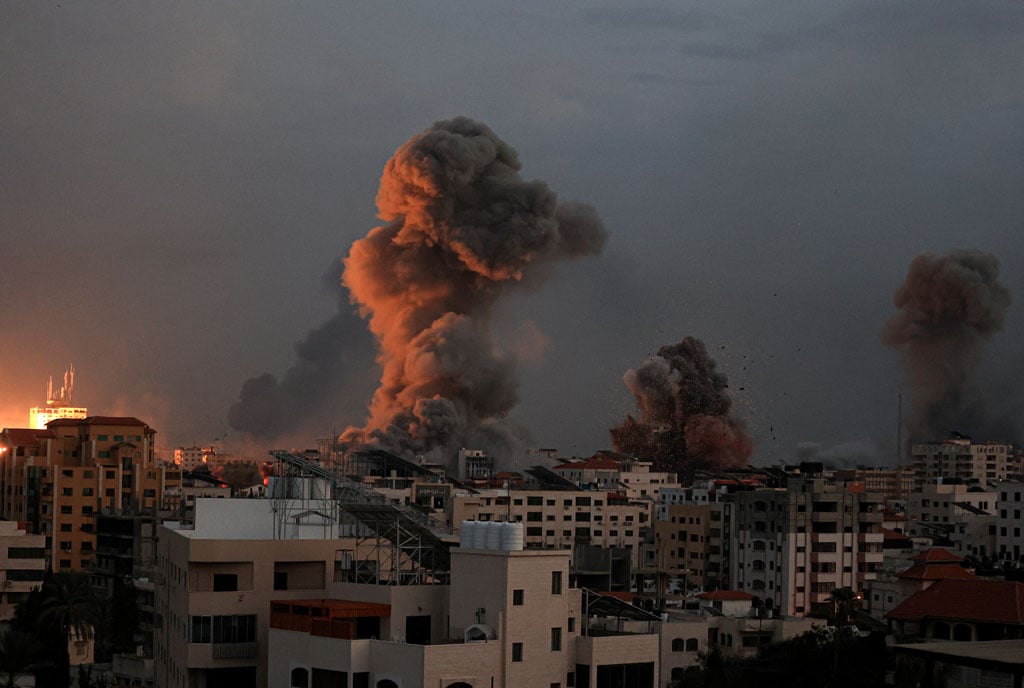Peaceful co-existence is possible through dialogue

Smoke billows and fires light the sky as the night falls on Gaza City during Israeli airstrikes on October 9, 2023. PHOTO/AFP
What you need to know:
- FYI. Religious wars have long been a topic of concern and debate, with the Israel-Palestine crisis serving as a stark reminder of their destructive nature, writes Msgr John Wynand Katende.
Believers in a mighty, peaceful, loving, and merciful God usually get perplexed when He seems to be unmoved, as violence threatens the prevalence of peace. Well, He respects our freedom but is awaiting reconciliation after sin.
Violence can denote a wide variety of experiences, such as bloodshedding, physical harm, forcing against personal freedom, passionate conduct or language, or emotions such as fury and passion. In general, religions, ethical systems, and societies rarely promote violence as an end in itself since violence is universally undesirable.
For the first three centuries of Christianity, warfare was not regarded as virtuous in any way.
Following Jesus’ teaching on nonviolence and love of enemies, the Church taught pacifism, to the extent of arguing against joining the military or using any form of violence against aggressors.
At the same time, there has always been a tension between the general desire to avoid violence and the acceptance of justifiable uses of violence to prevent greater evil. It is against this background that the history and scriptures of the world’s religions tell stories of violence and war.
Certain teachings from the Bible and Christian theology have been used to justify the use of force against heretics, sinners, and external enemies. This is how Jesus statement, “I come not to bring peace, but to bring a sword,” has been interpreted. It led to the emergence of the Crusades, or “holy war”, and the “enemies of God” terminology. Muslims associate the cross with violence because crusaders carried the sword and the cross.
However, some scholars believe that these Bible accounts are exaggerated or metaphorical.
Mature religion advocates dialogue, reconciliation, peace, love, and compassion. St. Francis of Assisi set a plausible example of peacemaking. In 1219, he journeyed to Egypt to meet with the Sultan Malik al-Kamil, who ruled over Palestine.
Through love and respectful listening, as well as the willingness to be changed by an aspect of truth expressed by another, Francis and the Sultan were able to establish that the truth is not the property of a single person, tradition, or religion; it can be found at the core of each person.
Francis was granted access to the Holy Land, where crusaders had failed to go. To date, the Franciscan Religious Order is the official custodian of the Christian holy shrines in the Holy Land on behalf of the Catholic Church.
Interfaith dialogue teaches that all religions have only Satan as their common enemy. There is, hence, no need to fight each other in the name of God.
Those who do so are manipulators. God can, after all, protect Himself and fight for His cause!
During His life and ministry, Jesus chose to engage people of other faiths in dialogue. “Whoever is not against us is for us”, said Jesus while responding to His disciples’ hostile attitude towards a man who was ministering in Jesus’ name but from outside their own camp (Mark 9:40).
He invites us to acknowledge good work by others, regardless of their religious, ethnic, or political backgrounds.
In 1986, Pope St. John Paul II initiated and promoted a forum for different religious leaders in Assisi to engage deeply in interfaith dialogue as learners, not converters, with a desire to celebrate as fully as possible the many paths to God.
Faith leaders have persistently affirmed the obligation of love of neighbour, the conviction that true faith can never be used to justify violence, the responsibility religious leaders have to educate their followers to respect others, and the need to continue inter-religious dialogue. “Dialogue is the intelligence to live together”.





